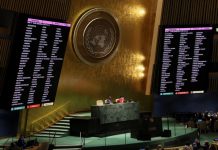Violence is escalating in Myanmar as forces use live ammunition against protesters demonstrating against military coup that ousted elected government of Aung San Suu Kyi. Global human rights watchdog Amnesty International said security forces deployed machine guns against peaceful protesters and shot one woman in the head.
Amnesty’s Crisis Evidence experts announced their findings on Thursday after analysing a video shared on social media of the shooting, which took place on Tuesday in the capital, Nay Pyi Taw.
Meanwhile, a close aide to Suu Kyi has been detained in a bid by the military junta to tighten grip on power. The aide, identified as Kyaw Tint Swe, a minister for the office of state counselor, was one of a handful of members of Suu Kyi’s National League for Democracy party who were taken from their homes overnight. The leadership of Myanmar’s electoral commission have also reportedly been detained. The commission rejected the military’s claims of widespread fraud in last November’s elections, which the NLD won in a landslide.
The latest detentions took place a day after the military raided the NLD’s national headquarters in Yangon.
Amnesty International said analysis of images from the protest showed a member of the police carrying a Myanmar-made clone of the Uzi sub-machine gun. The group contradicted the military’s claim that security forces only deployed non-lethal weapons during Tuesday’s protest.
The video of the young woman, identified as Mya Thwe Thwe Khaing, captured the exact moment when she was hit in the head by a bullet. The local media reported that the chances of the 19-year-old are slim.
Meanwhile, condemnation from around the world is growing against the military junta. United Nations expert on human rights Tom Andrews urged security forces to retreat as violence against protesters increased.
On the other hand, US President Joe Biden signed an executive order blocking Myanmar’s generals from access to $1 billion in assets currently held in the United States. President Biden and other leaders have demanded the military to restore the elected government to power.
The United Nations Human Rights Council will hold a special session Friday to discuss the crisis.
A British colony until 1948, Myanmar was ruled by military-backed dictators from 1962 until 2011.
An uprising in 1988 led to an election in 1990, which the NLD won in a landslide. But the elected members of Parliament were imprisoned, and the dictatorship continued.
In 2010, Senior General Than Shwe announced the country would be handed over to civilian leaders, who included retired generals. They freed political prisoners, including the lawmakers from the NLD, and Suu Kyi, who was elected in a 2012 by-election and later became the state counselor of Myanmar.





